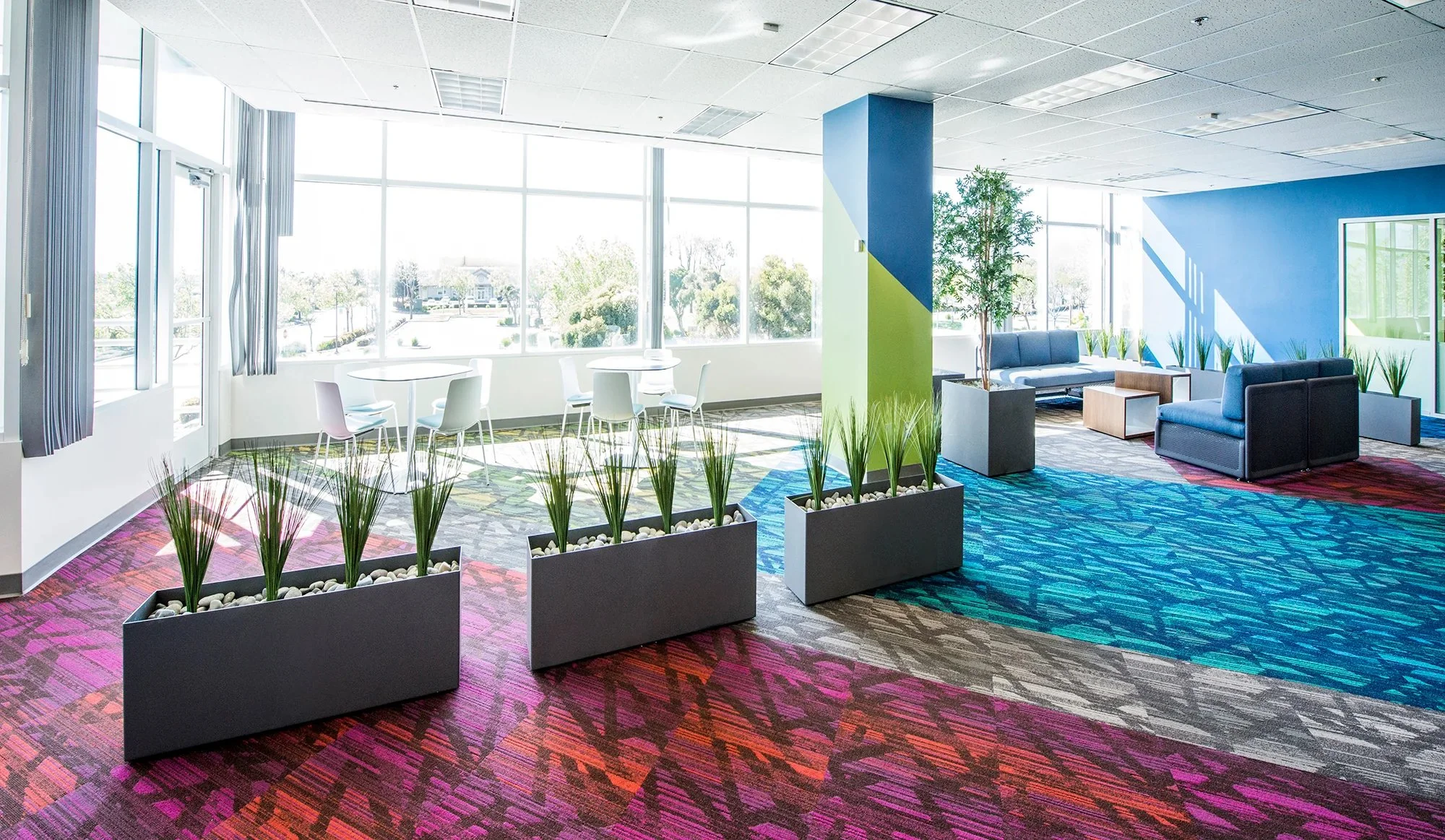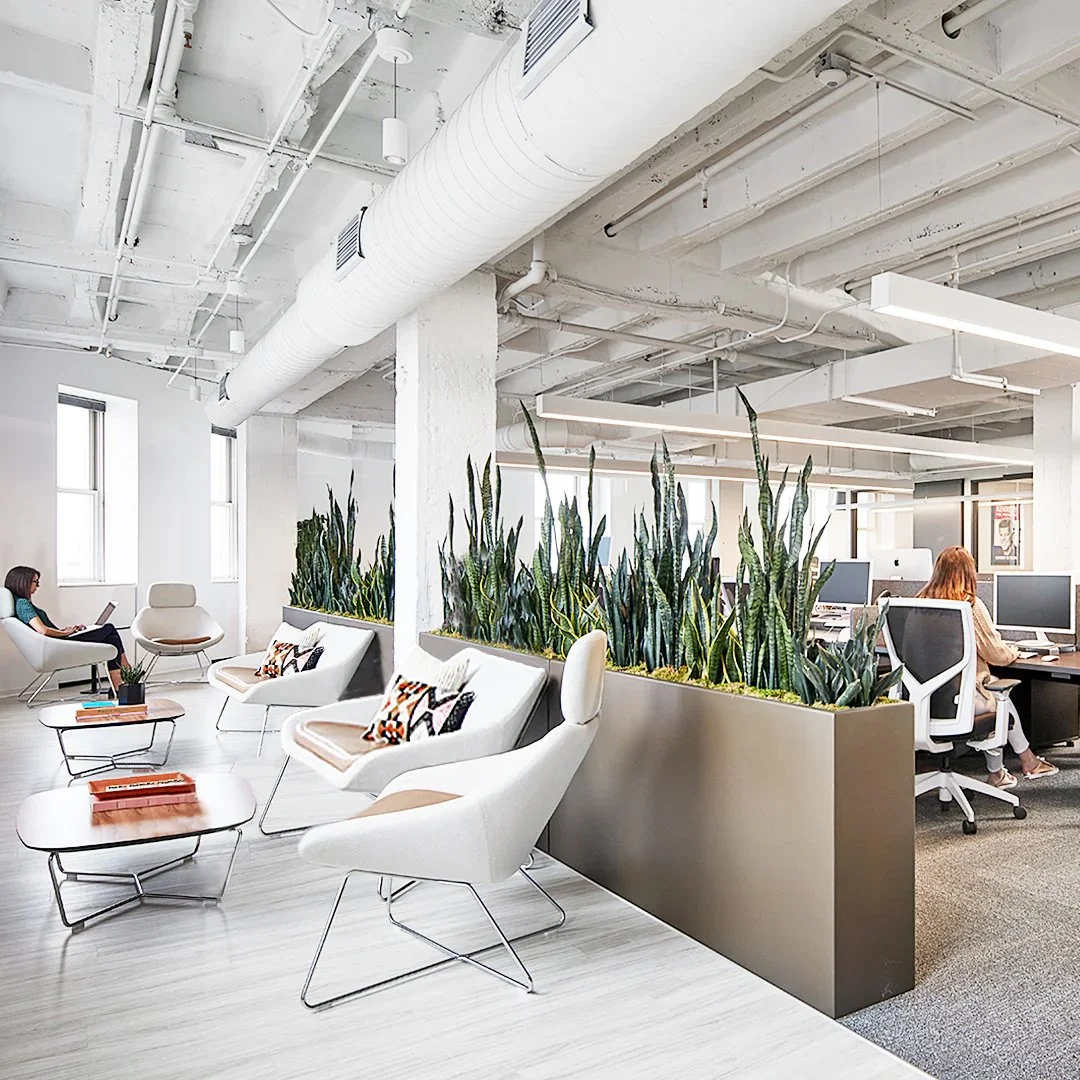How File Cabinet & Tabletop Planters Benefit Open-Concept Office Spaces
Open-concept office spaces have become extremely popular. But for all their benefits, they still offer some challenges. Luckily, file cabinet, and tabletop planters can help alleviate a lot of them.
Office layouts have gone through a lot of changes in recent decades, from private offices and cubicles to today’s more commonly-used open-concept floor plans and “hot desks.”
The modern open-concept office presents a lot of benefits, like an increased sense of community, improved collaboration and productivity, and the flexibility to accommodate today’s growingly distributed workforce.
But despite these benefits, open floor plans do also present some challenges. They’re statistically proven to reduce privacy and to be noisier than private office layouts.
So, what can organizations do to ensure their employees can benefit from the positive facets of open-concept offices while alleviating some of the challenging aspects?
Using strategically-placed planters to create office partitions might just be the unexpected solution.
Here’s how.
The Importance of Creating Office Partitions
A 2018 study found that 76% of employees surveyed disliked open offices, with the top reasons cited being:
A lack of privacy
Overhearing too many personal conversations
Having a hard time concentrating
Worries about someone overhearing sensitive information
So, while open-concept office design offers many benefits, employers should also consider using strategically-placed planters to create partitions to help alleviate these challenges.
This can be done using tabletop planters, endcap planters, and desktop planters that provide several advantages, including:
Reducing Sound Pollution
Plants aren’t just visually pleasing. Vegetation also reduces noise pollution through a phenomenon called sound attenuation. Attenuation means reducing noise intensity.
Normal sound attenuation happens as sound dissipates over long distances until there isn’t enough energy left to vibrate air molecules.
Plants can make this process significantly faster by absorbing, deflecting, and refracting sound.
For example, while a solid, rigid surface will simply bounce sound waves back toward their source, flexible materials, like thick, fleshy plant leaves and rough bark, will absorb sound waves. They’ll also vibrate when soundwaves hit them, in turn transforming the sound into other forms of energy and deflecting it in other directions.
You can use these properties to reduce sound pollution in your open-concept workspace.
Supporting Better Focus
By creating office partitions using tabletop planters and desktop planters, you can help employees increase their focus levels by reducing some of the most common workplace distractors, such as general office noise and chit-chat.
These partitions can make it easier for employees to opt-out of informal interactions happening in their vicinity while making it easier for them to get in the zone while working and hyperfocus on the task at hand.
Livening Up Your Open-Concept Workspace
In addition to reducing noise, supporting focus, and making your space look incredible, adding plants in your open-concept office can offer several other psychological and physical benefits as well.
In fact, studies have shown that plants have tangible benefits in office spaces, including:
Stress-relief
Improved productivity
Purified air
Bolstered creativity
Decreased absenteeism
To learn more about those benefits, check out our article: The 7 Unexpected Benefits of Plants in the Office.
Office Planter Locations
If you’re trying to decide where to put planters in your open-concept office space, there are a few places that will give you the best results as far as reducing noise, supporting better focus, and livening up your space.
On Top of File Cabinets
There’s a lot of unused surface space in any open-concept office which can be perfectly allocated to plants.
This includes on top of file cabinets. With file cabinet planters, you can create entirely new greenspaces in your office that reduce sound travel and boost your workspace’s look and feel.
If you’re trying to decide what type of planter to use on top of your file cabinet, check out our PurePots Mateo Tabletop Planter. Made from lightweight fiberglass, it’s space-conscious and easy to move, making it perfect for your workspace.
On Top of Desks and Tabletops
You can also use desktop planters and tabletop planters to help spruce up your office space and achieve your desired goals.
From conference and meeting rooms to breakrooms, desks, and communal workspaces, there are ample opportunities to transform open tabletops into surfaces that help reduce distractions and increase privacy.
And if your open-concept office has assigned seating, you can also allow your staff to add plants to their own desks.
When you’re shopping for a planter to put on top of your desk or tabletop, you might like our PurePots Sitta Tapered Square Planter or the PurePots Klass Round Tabletop Planter. Both of these are designed to be space-efficient and lightweight, so you don’t have to worry about them overwhelming your tabletop or being a challenge to move.
At The End of Desks of Cabinets
If you’ve got a little bit of extra space, you can use endcap planters at the end of your desks and cabinets.
These planter boxes sit on the floor and can be placed flush with your desks and cabinets, acting as seamless extensions that are as functional as they are visually appealing.
Depending on the size and style you’d like for your planters, our PurePots Webber Narrow Rectangle Planter, PurePots Cam Square Tower Planter, Modern Elite Wide Tower Planter offer a range of options to fit any space.
Open-concept offices offer a ton of benefits to both businesses and employees. But they also present a few disadvantages and challenges. Luckily, tabletop planters, endcap planters, and file cabinet planters can help alleviate many of them.
If you’re curious about how to choose the perfect planters for your open-concept office, contact us to speak with one of our experts today. We’re here to answer any questions you might have.



